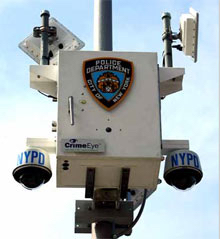
Legislation debated Wednesday before the New York City Council would force the NYPD to disclose some details about surveillance technology such as cellphone-tower replicators, X-ray vans, and license-plate readers. The NYPD also would need to adopt what lawmakers say are privacy disclosures similar to those of the Department of Homeland Security and other municipalities.
Under the POST Act —short for Public Oversight of Police Technology— the NYPD would need to publicly disclose each item?s current and future ?impact and use policies,? seek public feedback, and explain whether court permission is needed for deployment.
?Civilians are in control of the police force, not the reverse,? said Councilman Dan Garodnick (D-Manhattan).
The NYPD opposes the bill, saying it would provide a ?road map for terrorists.? Deputy Commissioner for Intelligence and Counterterrorism John Miller called it ?insane.?
?It would require the police department to list them, all in one place, describe how they work and what the limitations we place on our use of them,? Miller testified. ?In effect, it would make a one-stop-shopping guide for understanding these tools and how to thwart them.?
Garodnick said the bill sought only general, not operational, details.
The NYPD said the transparency bill was unnecessary. NYPD brass testifying Wednesday pointed to oversight already provided by the department?s existing inspector general, a court monitor under a settlement catalyzed by the NYPD?s past monitoring of Muslims, the patrol guide posted online and decades old Handschu guidelines, which constrain when and how the NYPD may conduct surveillance. The NYPD had once opposed these, Councilman Rory Lancman (D-Queens) noted.
At issue is computerized equipment deployed as part of criminal investigations and counterterrorism operations utilizing facial recognition software, body cameras, and more:
- The portable ?Stingray? device tricks nearby cellphones by mimicking cellphone towers and intercepting a target phone?s signal. In the process, the device can also vacuum up numerous phones of nearby innocent users.
- X-ray ?backscatter? vans, some military-grade, shoots X-rays to peer inside cars and buildings, exposing what the American Civil Liberties Union worries is potentially harmful radiation. Lawmakers also want to know how the van is deployed, how long images are retained and whose permission is required.
- License-plate readers affixed on posts across the city and on police cars scan every vehicle, logging the information into a database and cross-checking the plate for theft, terrorism or other wrongdoing.
?While legislation similar to this proposal has been enacted in other jurisdictions,? Miller said, ?it is fair to say that none of these jurisdictions are the number one target of terrorism worldwide.?
Garodnick and other lawmakers lamented that the NYPD has long opposed the bill, but until Wednesday, provided no specifics.
About The Author
Matthew Chayes
Newsday
matthew.chayes@newsday.com

